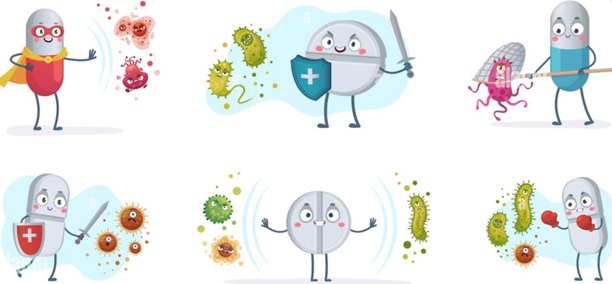
Development of antibiotics using under-represented peptide sequences.
Antimicrobial resistance is currently of great concern.
Bacteria have become able to survive the action of antibiotics by employing several resistance mechanisms.
Among them, the balance of the membrane permeability is a key process since the uptake of antibacterial compounds is the first event governing the efficacy of antibacterial activity.
In our lab, using an in-house computer program, we detected short (3-4 amino acids), linear amino acid sequences which are significantly under-represented (URSs) in bacterial proteomes, specific for each type of bacteria[1].
We proposed that these sequences are absent due to a deleterious effect on cell viability.
This hypothesis was verified after experiments in vivo, in vitro or by single molecule translation assays.
The human proteome does not lack any unique sequence of three-amino acids.
We now show that Incubation of bacterial cells with synthetic peptides containing the URSs is bactericidal.
Since these bacterial URSs are not missing from the human proteome, we predict that these peptides may be used as a novel type of antibiotics.
Recent determination of the three dimensional structures of ribosomes with bound URS peptides which allowed us to understand more about the molecular interaction between the URS and the ribosome submitted by Tarabeh et al .
The main goal in my research is to characterize the physicochemical characteristics of the URS peptides with respect to antibacterial efficacy (MIC), cellular penetration, peptide stability and resistance prevention, and based on these experiments to design superior URS peptides.
We propose that the existence of multiple URSs may enable the development of a method to overcome inevitable resistance .
Bacteria have become able to survive the action of antibiotics by employing several resistance mechanisms.
Among them, the balance of the membrane permeability is a key process since the uptake of antibacterial compounds is the first event governing the efficacy of antibacterial activity.
In our lab, using an in-house computer program, we detected short (3-4 amino acids), linear amino acid sequences which are significantly under-represented (URSs) in bacterial proteomes, specific for each type of bacteria[1].
We proposed that these sequences are absent due to a deleterious effect on cell viability.
This hypothesis was verified after experiments in vivo, in vitro or by single molecule translation assays.
The human proteome does not lack any unique sequence of three-amino acids.
We now show that Incubation of bacterial cells with synthetic peptides containing the URSs is bactericidal.
Since these bacterial URSs are not missing from the human proteome, we predict that these peptides may be used as a novel type of antibiotics.
Recent determination of the three dimensional structures of ribosomes with bound URS peptides which allowed us to understand more about the molecular interaction between the URS and the ribosome submitted by Tarabeh et al .
The main goal in my research is to characterize the physicochemical characteristics of the URS peptides with respect to antibacterial efficacy (MIC), cellular penetration, peptide stability and resistance prevention, and based on these experiments to design superior URS peptides.
We propose that the existence of multiple URSs may enable the development of a method to overcome inevitable resistance .

[1] Navon, S. P., Kornberg, G., Chen, J., Schwartzman, T., Tsai, A., Puglisi, E. V.,.. & Adir, N. (2016). Amino acid sequence repertoire of the bacterial proteome and the occurrence of untranslatable sequences. Proceedings of the National Academy of Sciences, 113(26), 7166-7170.
Read MSc Thesis
Publication
description

